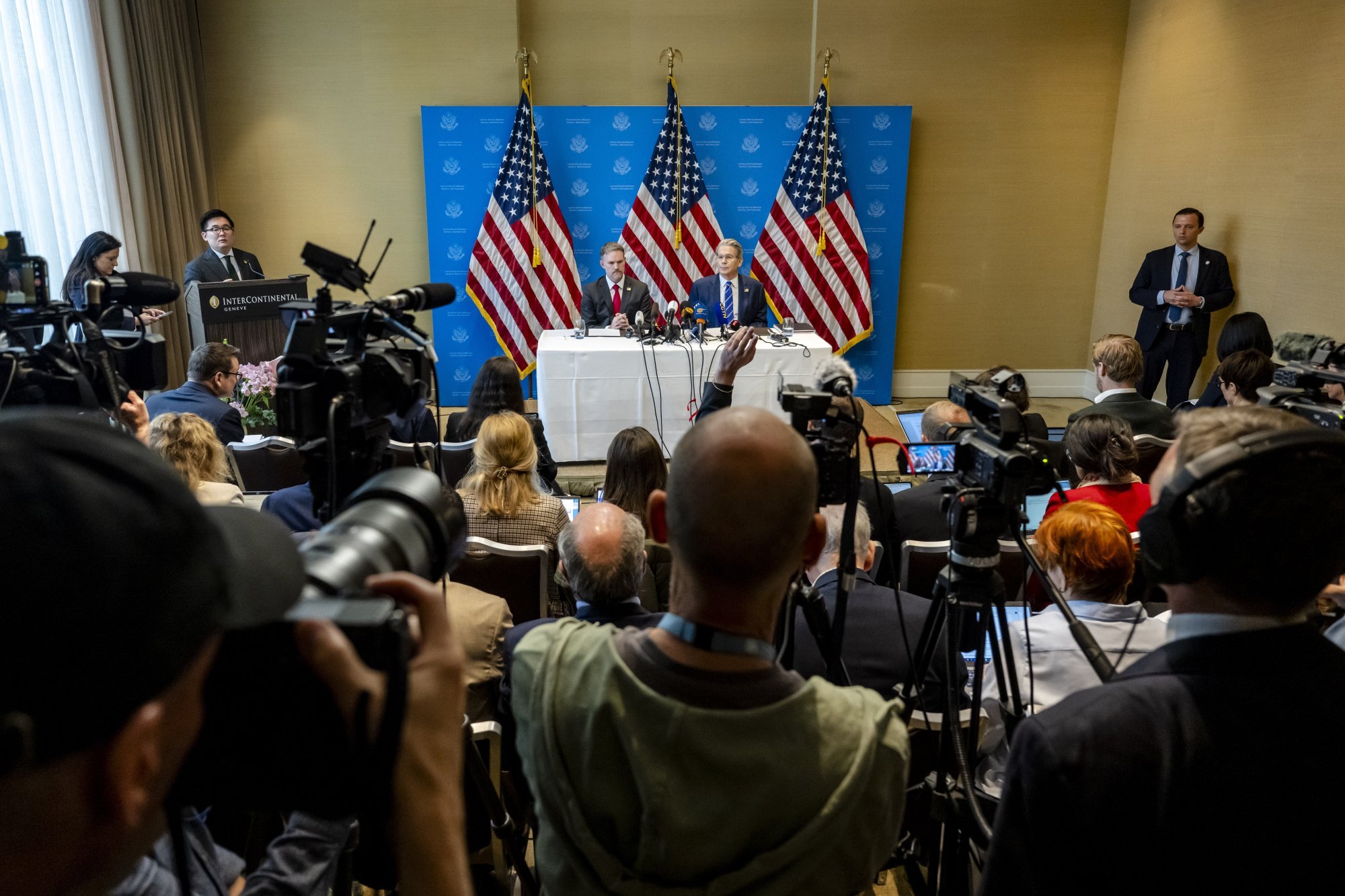A China General Chamber of Commerce – USA survey released Monday showed half of Chinese companies operating in the United States plan to shift emphasis away from investments in the country in light of Trump administration tariff policies.
The business group conducted the survey of almost 100 Chinese enterprises operating in the US in March and April, finishing shortly before US President Donald Trump’s so-called “reciprocal” tariffs on Chinese products of 145 per cent and Beijing’s retaliatory 125 per cent tariffs.
After weekend talks in Switzerland, both sides agreed Monday to lower tariffs for 90 days, with US tariffs reduced to 30 per cent and Chinese tariffs to 10 per cent.
Do you have questions about the biggest topics and trends from around the world? Get the answers with SCMP Knowledge, our new platform of curated content with explainers, FAQs, analyses and infographics brought to you by our award-winning team.
Respondents to the CGCC survey included companies in 11 sectors, including consumer goods and services, energy, industrial firms, real estate, and communication services, with financial companies taking the largest share.
Among the companies saying they plan to reduce their investment in the US market, 22 per cent said they would “significantly decrease” their focus on US investments and plan to suspend or withdraw most investments. Another 28 per cent indicated a “slight decrease” in priority and said they would consider scaling back some investments because of current administration policies.
In contrast, 22 per cent of respondents said they would increase their US investment and 28 per cent said they would maintain investment.
The results revealed widespread pessimism about future investment in the US under the second Trump administration, contrasting with findings showing that Chinese companies’ assessment of the US business environment improved notably during the final year of former president Joe Biden’s term.
As the survey concluded before Trump announced his new levies on April 2, it added that the tariffs and related policies may have “further deepened business pessimism – beyond what is reflected in this survey”.
In another survey question, none of the respondents said they think Trump’s policy will have “significant” promotion or limiting effect on their US market expansion, but 50 per cent said it will have “moderate hindering effect”, compared with 17 per cent saying they expect a “moderate promoting effect”.
The companies identified a wide range of expected challenges to their US operations this year and next, with 90 per cent citing the stalemate in bilateral political and cultural relations, 73 per cent pointing to frictions in economic and trade ties, and 60 per cent flagging restrictive US foreign investment policies.
US domestic issues also ranked high among Chinese investors’ concerns. According to the survey, 80 per cent of respondents cited inflation and economic instability as major risks. Other frequently mentioned challenges included high compliance and litigation costs, as well as exchange rate volatility.

The chamber urged Chinese firms to adopt flexible strategies incorporating steps to deal with risks, including “core and backup” investment portfolios prioritising “business-friendly” regions.
The chamber said investors should “decentralise” research and development, strengthen collaboration with US companies and improve compliance in the face of hi-tech restrictions.
To hedge geopolitical headwinds in particular, it suggested the companies develop local talent recruitment and work with industry alliances to strengthen their voices.
“Ongoing tariffs and tightening export controls on technology have significantly increased business costs and market pressures. Although the US economy has shown signs of stabilisation, high interest rates, persistent inflation, and labour shortages continue to pose serious uncertainties,” Hu Wei, the chamber’s chairman and president and CEO of Bank of China USA, said in the survey.
“In this context,” he said, “adapting to a shifting policy and economic environment has become a critical priority for Chinese enterprises in the US.”
Chinese direct investment in the US has dropped significantly since Trump’s first administration, and the trend continued in Biden’s term amid growing US restrictions on Chinese investment, especially in the hi-tech sector.
That investment was US$28 billion in 2023, down 6.2 per cent from 2022, according to the latest US official data, led by manufacturing, real estate, and banks and similar institutions.
Several former US trade representatives Monday underscored the uncertainty plaguing US-China trade relationship despite this weekend’s thaw.
“I don’t pay all that much attention to what the particular tariff rate is ... it’ll change 10,000 times between now and 90 days from now,” Charlene Barshefsky, former US president Bill Clinton’s trade representative, told an event at the Centre for Strategic and International Studies.
Barshefsky, who helped negotiate China’s entry into the World Trade Organization, added that it was “good” that both sides, particularly the US, had “climbed down from the ledge” and recognised the need to get back to “managing” rather than “transforming” the bilateral relationship.
Carla Hills, former President George H.W. Bush’s top trade envoy, called the 90-day tariff reduction a “very small step forward” towards easing uncertainty, saying it does not provide the longer-term assurance that companies need.
“There may be some purchases to quickly get ahead of a problem,” she said, but US markets and business still do not know, “in an overall way, what the rules are going to be in our own country”.
More from South China Morning Post:
- China, US reduce majority of tariffs after first round of trade talks
- Donald Trump says he may speak to Xi Jinping this week following US-China tariff agreement
- How the US-China trade talks beat expectations and stopped the bleeding, for now
- Temu points Chinese sellers to Middle East, Latin American markets amid US tariff woes
- Stocks, dollar surge after China and US agree 90-day tariff relief
For the latest news from the South China Morning Post download our mobile app. Copyright 2025.





